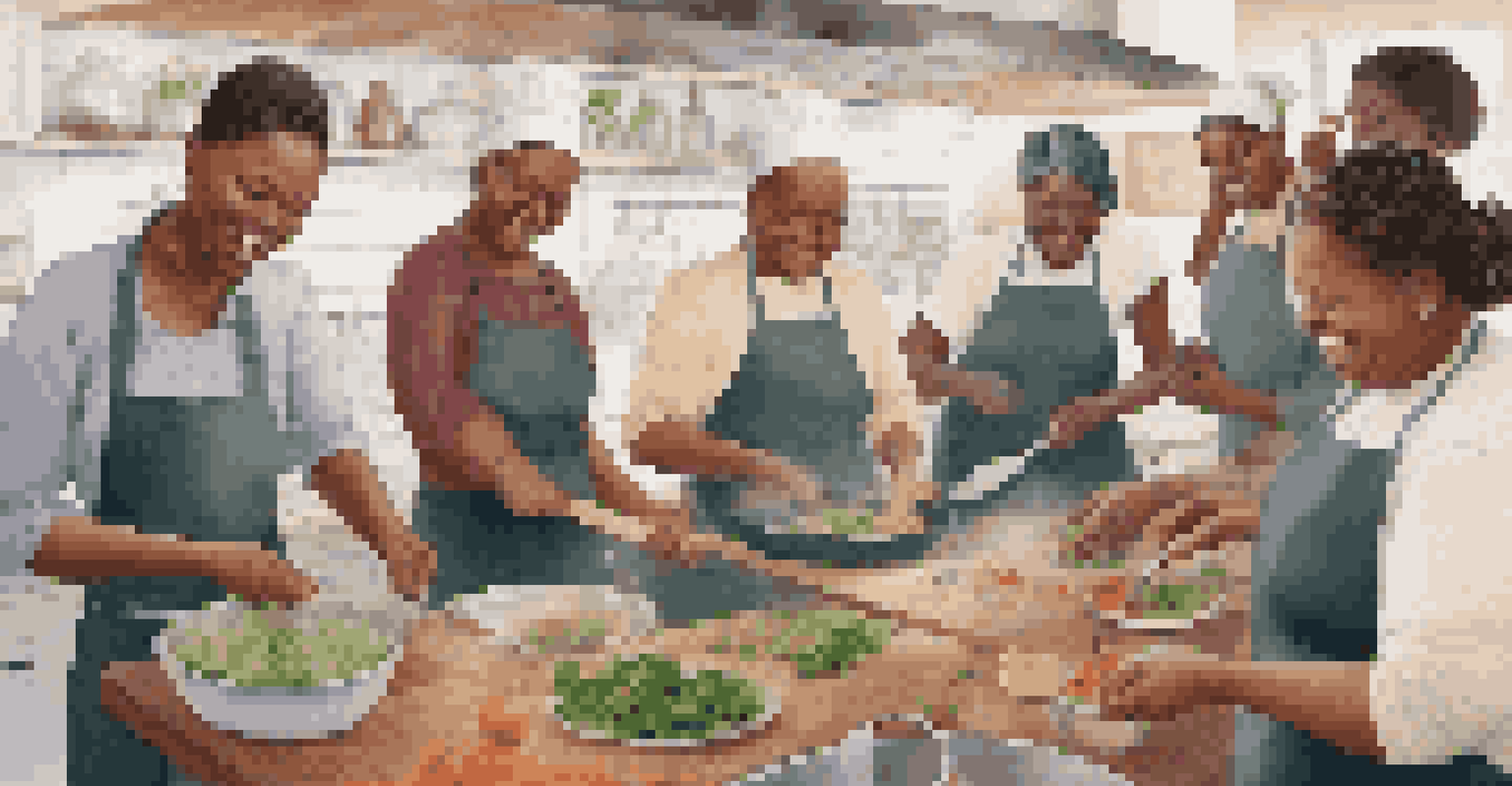The Importance of Cooking in Food Recovery and Waste Reduction

Understanding Food Waste and Its Impact
Food waste is a significant global issue, with about one-third of all food produced going uneaten. This not only squanders valuable resources like water and energy but also contributes to greenhouse gas emissions, worsening climate change. By understanding the scale of food waste, we can better appreciate the need for effective solutions.
Waste is a design flaw.
In our kitchens, food waste often accumulates from over-purchasing, improper storage, and lack of creativity in using leftovers. For instance, many people toss out vegetables that have seen better days instead of transforming them into a hearty soup. Recognizing these habits is the first step toward making a change.
Cooking plays a crucial role in addressing food waste. It empowers individuals to use up ingredients before they spoil and encourages them to think creatively about how to utilize every part of their food, ultimately leading to more sustainable practices.
The Culinary Skills That Matter
Having basic cooking skills can dramatically reduce food waste. When you know how to prepare meals from scratch, you're less likely to rely on pre-packaged items that often come with excess packaging and shorter shelf lives. For example, learning to make a simple stir-fry can help you use up a variety of vegetables that might otherwise go to waste.

Additionally, cooking at home allows for better portion control. By understanding how much food you need for a meal, you can avoid over-preparing and ensure that leftovers are enjoyed rather than discarded. This not only reduces waste but also saves money in the long run.
Food Waste: A Global Concern
One-third of all food produced is wasted, squandering resources and contributing to climate change.
Moreover, cooking encourages experimentation. When you get comfortable in the kitchen, you're more willing to try new recipes and use up whatever ingredients you have on hand. This creativity can lead to delicious meals that minimize waste and make the most out of what you have.
Planning and Preparation: Key Strategies
Effective meal planning is a game-changer in reducing food waste. By taking the time to plan your meals for the week, you can create a shopping list that reflects exactly what you need, minimizing impulse buys that often lead to waste. For instance, if you plan to make a vegetable stir-fry, you can ensure you only buy what you’ll use.
Cooking is like love. It should be entered into with abandon or not at all.
Preparing ingredients in advance also helps to extend their lifespan. For example, if you wash and chop your vegetables immediately after purchasing them, you’re more likely to use them in meals throughout the week. This simple habit can significantly cut down on the likelihood of forgetting about them in the back of the fridge.
Lastly, having a designated 'leftover night' can be a fun way to use up food that might otherwise go to waste. It encourages creativity and can even become a family tradition, making it easier to incorporate leftover ingredients into new and exciting meals.
Understanding Expiration Dates and Food Safety
Many people misinterpret expiration dates, leading to unnecessary food waste. Understanding the difference between 'sell by,' 'use by,' and 'best before' labels can help you make more informed decisions about food safety. For example, many items are still good to consume after their 'best before' date, often just needing a little TLC.
Food safety practices also play a role in waste reduction. Proper storage techniques, such as keeping fruits and vegetables in the right conditions, can extend their freshness. For instance, storing herbs in water can keep them vibrant for longer, allowing you to enjoy them in multiple meals.
Cooking Skills Reduce Waste
Basic cooking skills empower individuals to creatively use ingredients and minimize food waste.
Additionally, learning to recognize signs of spoilage can empower you to make better choices about what to keep and what to toss. Instead of automatically discarding food, take a moment to inspect it; you might find that some items still have plenty of life left in them.
Creative Cooking: Turning Leftovers into New Dishes
One of the most enjoyable aspects of cooking is the ability to transform leftovers into something new and delicious. For example, yesterday's roasted chicken can become today's chicken salad or soup. This not only prevents waste but also adds variety to your meals, making them more exciting.
Using leftover ingredients creatively can spark culinary inspiration. Maybe those extra tortillas can be turned into a breakfast quesadilla, or your slightly wilted greens can be blended into a refreshing smoothie. By viewing leftovers as opportunities rather than burdens, cooking can become a fun challenge.
Moreover, sharing your creations with friends or family can foster a sense of community. Hosting a potluck or sharing recipes can inspire others to do the same, amplifying the impact of food recovery and waste reduction within your social circles.
Community Initiatives: Cooking for a Cause
Many communities have embraced food recovery initiatives that focus on cooking as a means to reduce waste. For instance, organizations often host cooking classes that teach participants how to utilize surplus food from local farms or grocery stores. This not only reduces waste but also strengthens community ties.
Food banks and shelters frequently rely on volunteers to prepare meals from donated ingredients, showcasing the importance of cooking in food recovery efforts. By participating in these initiatives, individuals can make a tangible difference while honing their culinary skills.
Community Cooking Initiatives
Community programs that focus on cooking help reduce waste and foster social responsibility.
Moreover, these community efforts often emphasize sustainability and nutrition, helping to educate participants about the broader implications of food waste. By connecting cooking with social responsibility, they inspire a collective movement towards a more sustainable food system.
The Personal Benefits of Cooking for Waste Reduction
Cooking at home for food recovery offers numerous personal benefits, from increased culinary skills to enhanced well-being. Engaging in the cooking process can be therapeutic, providing a creative outlet and a sense of accomplishment. When you take control of your meals, you also become more aware of your food choices.
Additionally, preparing meals at home typically leads to healthier eating habits. You can choose fresh, whole ingredients and control portion sizes, which can contribute to overall better health. This shift not only impacts your well-being but also promotes a sustainable lifestyle.

Lastly, cooking fosters a connection to food that many people lose in today's fast-paced world. By valuing ingredients and understanding their journey, you gain a greater appreciation for what you consume. This mindset shift can lead to more mindful eating habits and a commitment to reducing waste.